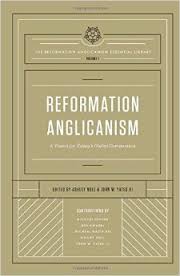Reformation Anglicanism – a Vision for Today’s Global Communion
 Book Review by Chris Sugden, CEN:
Book Review by Chris Sugden, CEN:
Currently many have questions about the Church of England and the Anglican Communion: given the trajectory of some to focus on baptism to the exclusion of behaviour, concerns that discipline based on biblical faithfulness is often ignored, and unfudgeable disagreement about how to interpret the bible, it is understandable that questions are asked about whether, how and why to remain in Anglican fellowship.
With Bishop Michael Nazir Ali (Pakistan and England), Archbishop Ben Kwashi (Jos, Nigeria) and Dr Michael Jensen (Australia), Ashley Null (Germany) and John Yates III (USA) provide important resources for addressing the question why. Through the understanding of the global Christian church (Nazir Ali), the nature of ministry that transforms people and communities (Kwashi), the primacy of Scripture in its formularies, liturgy and the role and calling of a bishop, Anglican church formularies and liturgy as shaped over the three centuries of the Reformation process, faithfully preach the biblical gospel of repentance and faith calling people into God’s transforming kingdom.
Nazir Ali traces the development and nature of the Anglican Communion, a reprint of his Latimer Booklet of 2013 “How the Anglican Communion began and where it is going”. through ‘movements of people responding to the call of God on their lives”. Its renewal will come “ not through the reform of structures or through institutional means but through movements raised up by God” for planting churches, renewal in worship, campaigners for the poor and persecuted. ( p 43)
Kwashi expounds the transforming power of the gospel as we seek the kingdom of God, rather than our own power and status, by relying not on our own natural power, but on God working through us by the Spirit.
The relation of scripture, reason and tradition is more accurately described not as a three legged stool, but to see “ Scripture as a garden bed in which reason and tradition are tools used to tend the soil, unlock its nutrients and bring forth the beauty within it.” (Null p. 86). The whole thrust of Anglican liturgy was to teach people the scriptures. The Church of England would only succeed, Cranmer held, if the English people regularly sat under the transforming power of Scripture and its message expressed in Morning and Evening Prayer and the Holy Communion. (198) The chief responsibility of Bishops is to “proclaim and defend the apostolic faith as taught by the Scriptures” (195) since Christian fellowship can only be based on a common understanding of saving faith (196). They show their authentic apostolic succession by what they teach and what they reject.
Some Anglicans argue for change because they put the cart of works before the horse of faith. They find that people cannot follow a biblical way of life with attendant fear and shame, and so they reject certain parts of the Bible and ask the church to settle instead for what people think they can do. (p 192)
In the light of this, Michael Jensen discusses Bishop Tom Wright’s “New Perspective on Paul” which “declares faith to be the badge of belonging to the covenant – not the basis for belonging itself, but its sign.” Jensen asks if faith as evidentiary for, or an instrument of salvation, is necessarily a binary choice. (146)
Much current preaching is seen as ‘nagging’ congregations either to try harder to protect the environment, fight racism and work towards economic equality, or to be godly, draw closer to God and serve their neighbours. Both in effect put the cart of pleasing God before the horse of what God has promised to do for us. “Telling people what to do does not empower them to do it. That was Cranmer’s fundamental Reformation insight. Only love can overcome the power of sin, and such love comes from knowing the unconditional love of God revealed in Jesus’s death and resurrection for us…Only the assurance that God will love us through good times and bad….has the power to change who we are and how we live.” ( p 191 f)
The book’s index is most useful for turning up those timely reminders of key points in Anglican ecclesiology.
Reformation Anglicanism – a Vision for Today’s Global Communion
Edited by Ashley Null and John W Yates III
Crossway 2013 220 pages including index £28.23





